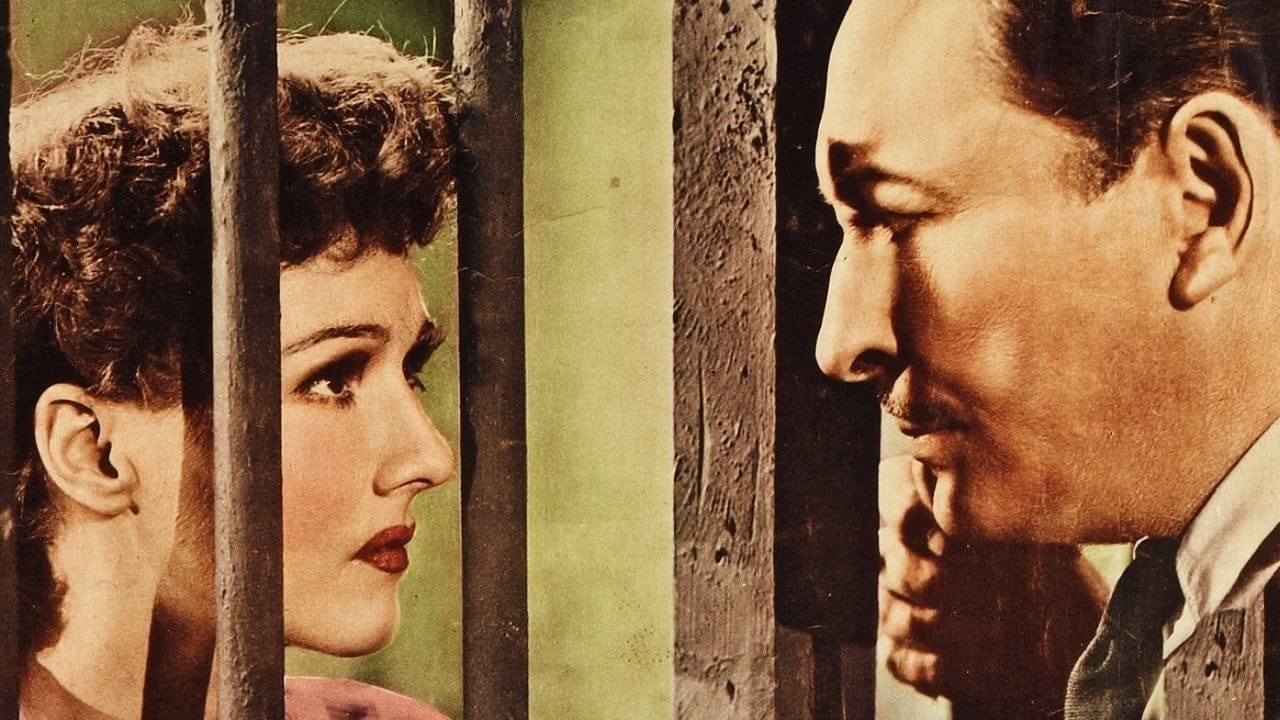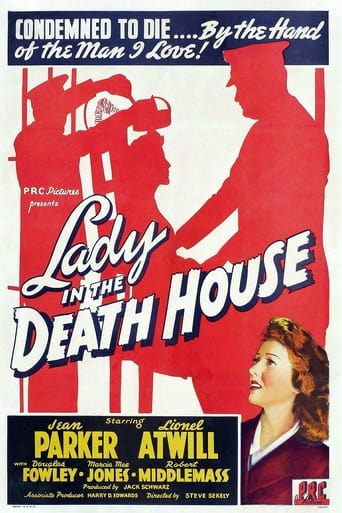


Really Surprised!
... View MoreDon't Believe the Hype
... View MoreOne of the best movies of the year! Incredible from the beginning to the end.
... View MoreExactly the movie you think it is, but not the movie you want it to be.
... View MoreAs the movie opens, Mary (Jean Parker) is making her way to the electric chair. Crimanologist/psychologist Charles Finch (Lionel Atwill) believes Mary to be innocent, but is running out of time to prove it. To make matter worse, Mary's boyfriend is the State's executioner and will throw the switch on Mary. Can Mary be saved in time? Lady in the Death House is far from the worst of the Poverty Row films I've seen, but it still has a number or problems. First, there are far too many utterly ridiculous plot points. To start with, Mary's boyfriend is (conveniently) the executioner. Why not get someone else to do this one? Ridiculous! The witnesses used at the trial that help convict Mary saw the murder through a solid shade, meaning they only saw a silhouette. Any first year law student could have poked holes in this eyewitness evidence. Ridiculous! Next, as evidence is gathered that will clear Mary, the Governor, the only person who can stop her execution, has (inconveniently) stopped for a Denver sandwich and can't be reached. Again, ridiculous! There are many more of these ridiculous moments that make much of the movie . . . ridiculous.That's not to say it's all bad. Lady in the Death House does feature better than expected (at least for this kind of movie) acting. Lionel Atwill is the kind of actor that's always good. It's an interesting change of pace seeing him play the hero. Jean Parker, Douglas Fowley, and Marcia Mae Jones hold up their end and give solid performances. Another plus is the "look" of the film. A lot of these Poverty Row films look like they were shot on the same dirty, poorly lit set. Not here. Sets and lighting look better than the budget would suggest. Finally, I thought the use of flashbacks was a nice way to tell the story of Lady in the Death House. We see Mary headed to the electric chair, but have to wait 50+ minutes to see if she really is put to death. Quite nice.Overall, the bad outweighs the good and I'm left rating the movie a 4/10.
... View More"Lady In The Death House" is an interesting crime tale, largely told in flashbacks. Although the script has some hard-to-believe points, it does work up some suspense by the end. Although the production is very low budget, director Steve Sekely employs some creative "swipes" and other transition techniques from scene to scene. And although some of the supporting performances (particularly from the police inspector and the wide-eyed little sister) are a bit amateurish, Jean Parker gives an affecting performance as the doomed-to-die heroine (a 180 degrees different role for her from Kitty O'Day, whom she played the same year), and Lionel Atwill gives a solid center to the film in a rare, for him, good-guy role. The existing prints of this movie are pretty damaged, but I doubt we're going to get a remastered version anytime soon.
... View MoreI decided to watch this ultra-low budget film from the "Poverty Row" studio, PRC, because it co-starred the exciting character actor, Lionel Atwill—plus I really liked the title. Even though Atwill often played in these cheap movies, his excellent style of acting always made the films seem a lot better, as his screen persona was great (his real life is also quite interesting—sort of like a bizarre soap opera). The reason I use the term "Poverty Row" is that this was a nickname given to the very cheapest and worst production companies of the era. Many of these weren't even real studios, but production companies that rented space and sets from the major studios at night! Yes, there is a good chance this was filmed after normal working hours—a common thing for such studios.The story begins with Lionel Atwill telling his friends a story about something that he was involved with years ago. A doctor falls in love with a lady but he's afraid to tell her about himself. That's because his job is putting people to death on Death Row—not exactly a glamor job! The Doc asks his friend (Atwill) for advice on how to break it to her, but regardless she won't have the man. Later, you realize it's because her own parents were criminals.Later, a man is killed and the lady is implicated—though it's obvious to anyone with a brain that her sister was involved (and is a bit of a nut) and the evidence against the lady was poor. But, apparently the jury was filled with brainless people and she was convicted and sent to Death Row. Even more brainless is that her old boyfriend was the man who was responsible for her execution. Don't you think someone else might just be able to handle this case?! Until this fateful hour, her friend (Atwill) spends much of the film trying to prove her innocence—and prove that the flaky sister knows far more about the case than she'll admit.Overall, the movie is only mildly interesting and a bit silly. While it is watchable and Atwill is good (as usual), the rest of the film never really rises above the mundane and some of the acting is pretty shabby. It's sub-par and about what you'd expect from such a low-budget flick—and nothing more despite the cool title.
... View MoreThis tautly constructed little movie should serve as a model for those modern film authors who cannot unfold the simplest story line in less than two hours.The movie opens with Mary Kirk being led from her cell to walk to the death chamber. She leaves a letter for Charles Finch, a psychologist and criminologist. In it she has outlined the events which led to her situation. We then see Finch reading the letter to a small group of reporters, supplementing it with an account of his own involvement in the affair. His first person narrative alternates with flashback depiction of the events. Half way into the movie he has reached the point at which Mary was convicted and sentenced to death. The next 20 minutes cover his subsequent efforts to find the evidence which will clear her. He still has not succeeded by the time we have caught up to the opening of the movie and see Mary finish her walk to the electric chair. The remaining few minutes are a desperate race against the clock played more or less in real time.The movie does not waste an inch of film. Every scene conveys information and advances the action, with smooth and skillful links. Particularly effective is the way in which the character of Mary's younger sister, Suzy, is handled. Her appearances are almost always incidental to the main action, but as the movie progresses it becomes clear that she is somehow central to the solution.The nature of the plot means that the title character plays a passive rather than an active role. Jean Parker is persuasive in the part, wisely forgoing the opportunities for melodramatics. Marcia Mae Jones' porcelain-doll prettiness frequently led to her being cast as a vain and foolish little madam, and her role here as Suzy suits her talents. Lionel Atwill makes a convincing sleuth, neatly conveying a blend of scientific detachment, humanitarian concern, and an occasional twinkle of humour.Anybody who thinks that "first class B movie" is an oxymoron should study this film and learn better.
... View More